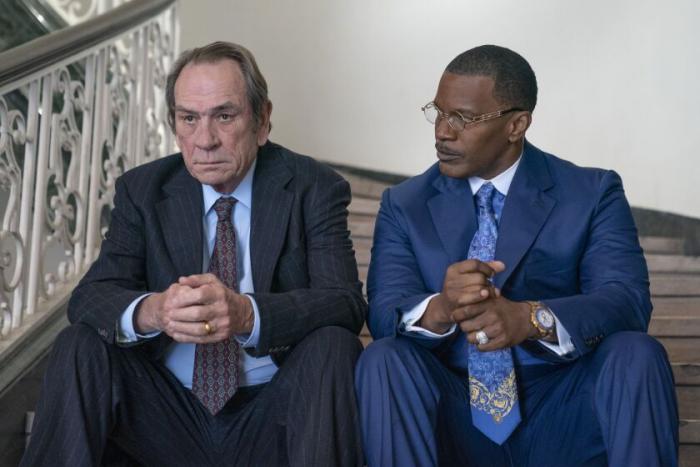By Dustin Rowles | Film | October 16, 2023

Jamie Foxx stars as the flamboyant personal injury attorney Willie Gray in Prime Video’s based-on-a-true story film, Burial, which is a hoot-and-a-half of old-school dramedy. We often complain that there are no more mid-budget movies for adults, but it’s hard to complain too much in a year that has brought us Fair Play, Air, and now The Burial, in our own homes, no less.
It’s a blast to watch Jamie Foxx play the son-of-a-sharecropper turned multimillionaire attorney who aspires to be the next Johnnie Cochran (the events of The Burial happened in the ’90s around the same time the OJ verdict was handed down). To his credit, however, Foxx keeps the character grounded enough; he never becomes a cartoon as he takes on a Canada-based funeral chain, Loewen Group, on behalf of his client, Jeremiah O’Keefe, played by Tommy Lee Jones, with a perfect blend of heart and irascibility.
The O’Keefes have been in the funeral business for decades, and Jeremiah intends to keep his business going for the next generation. When Jerimiah runs into financial problems, however, he turns to the Loewen Group and its CEO Ray Loewen (Bill Camp) to buy three of his nine funeral homes and bail him out.
Loewen agrees to the terms of the deal but drags its feet in closing it, effectively making it impossible for O’Keefe to provide his business with an infusion of money or move on to another potential buyer. It’s one of many tactics the Loewen Group uses to run funeral parlors out of business, take over, and price gouge customers in large, poor, mostly Black areas of the South.
That’s why, with the advice of his attorney, Hal Dockins (Mamoudou Athie), Jeremiah — something of a small-time civil-rights champion himself — hires Willie Gray to take on the Loewen Group: Dockins believes a Black attorney is needed to persuade a mostly Black jury in a predominantly Black Mississippi county of the sins of a Canadian conglomerate.
Willie Gray is initially hesitant to take on the case because he doesn’t do contract cases, and he especially doesn’t do cases for small sums like $8 million. Gray decides to expand the case, however, and demands a $100 million settlement from the Loewen Group, which adamantly refuses and hires their own attorney, Mame Downes, played with intelligence and mischievousness by Jurnee Smollett. (Downes is one of the few fictional creations in the film).
It’s a contract case, but in the movie — and real-life — Willie Gray positions it as a case about race, specifically how a large funeral conglomerate takes advantage of Black families during their worst moments. Four short paragraphs in a 1996 NYTimes piece about the case sum up the essence of the film:
But Mr. Loewen, who likes to tell investors that his first management decision was to fire his brothers from their parents’ small Mennonite funeral home in Manitoba, rejected the notion that the verdict, by a black-majority jury, represented a populist consumer revolt.“I don’t think they had the capability of thinking that far,” he said of the jurors, an opinion echoed by his entourage of executives from Vancouver. They portrayed the jurors as dupes of courtroom showmanship who succumbed to xenophobia and a desire for racial empowerment.
Their contempt was amply returned by the jurors, whose eight black members included a budget analyst with the City of Jackson and a longtime assistant to the former Mississippi Secretary of State. The foreman, one of four whites, was a retired electrical engineer born and reared in Canada.
The foreman, Glenn Millen, said in Jackson this week that Mr. Loewen “was a rich, dumb Canadian politician who thought he could come down and pull the wool over the eyes of a good ole Mississippi boy. It didn’t work.”
Damn right. Even in that 25-year-old article, it’s easy to feel the contempt Ray Loewen feels for the jury. Bill Camp more than capably gets that across in a cross-examination reminiscent of the Jack Nicholson one in A Few Good Men: Willie Gray merely gives him the rope, and Loewen does the rest.
It’s a real crowd-pleaser, especially for fans of legal dramas, even if it papers over the details of the contract case with more palatable, easier-to-understand claims. It stays out of the weeds, although I might have enjoyed spending more time with the legal arguments. But then again, the actual case was less about the case law and more about how Willie Gray convinced a predominantly Black jury to punish an entitled white man who mocked and underestimated them. When the comeuppance is this well-earned, it is satisfying as hell to witness.